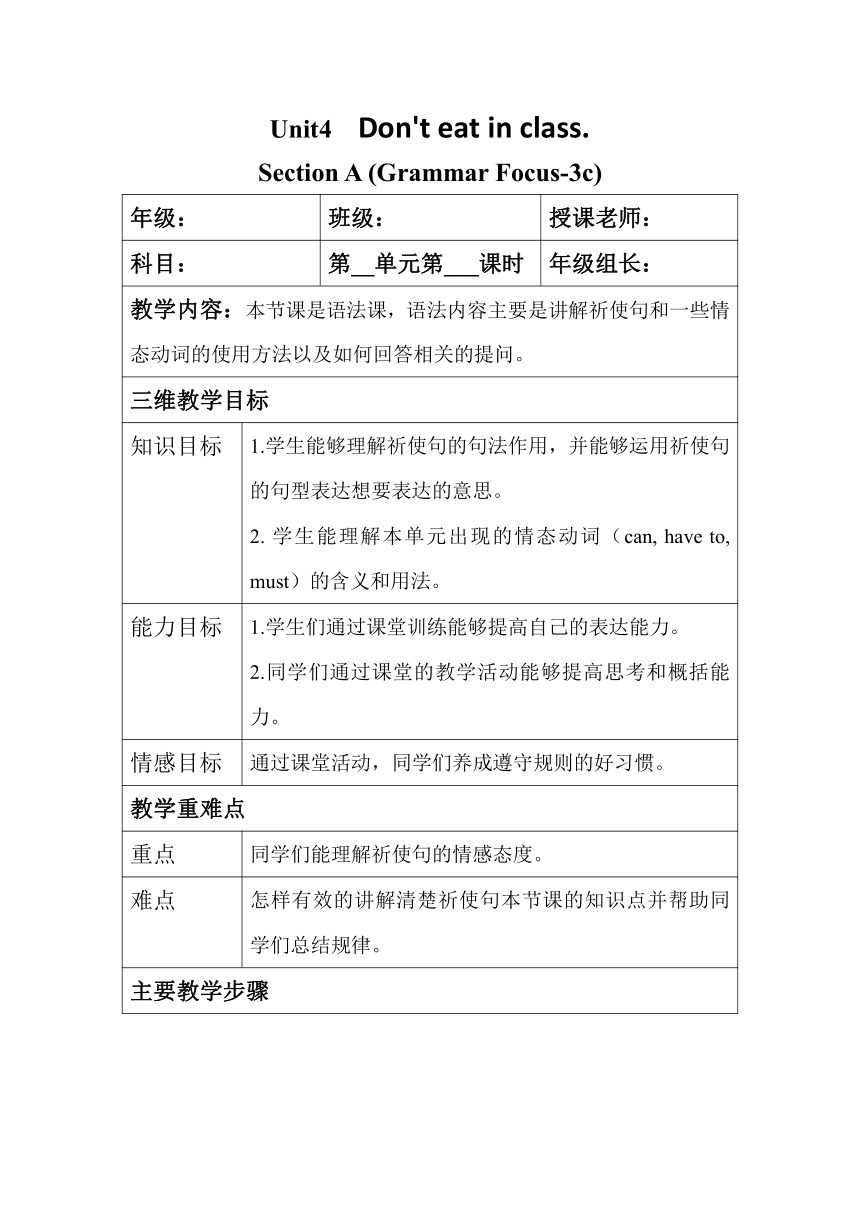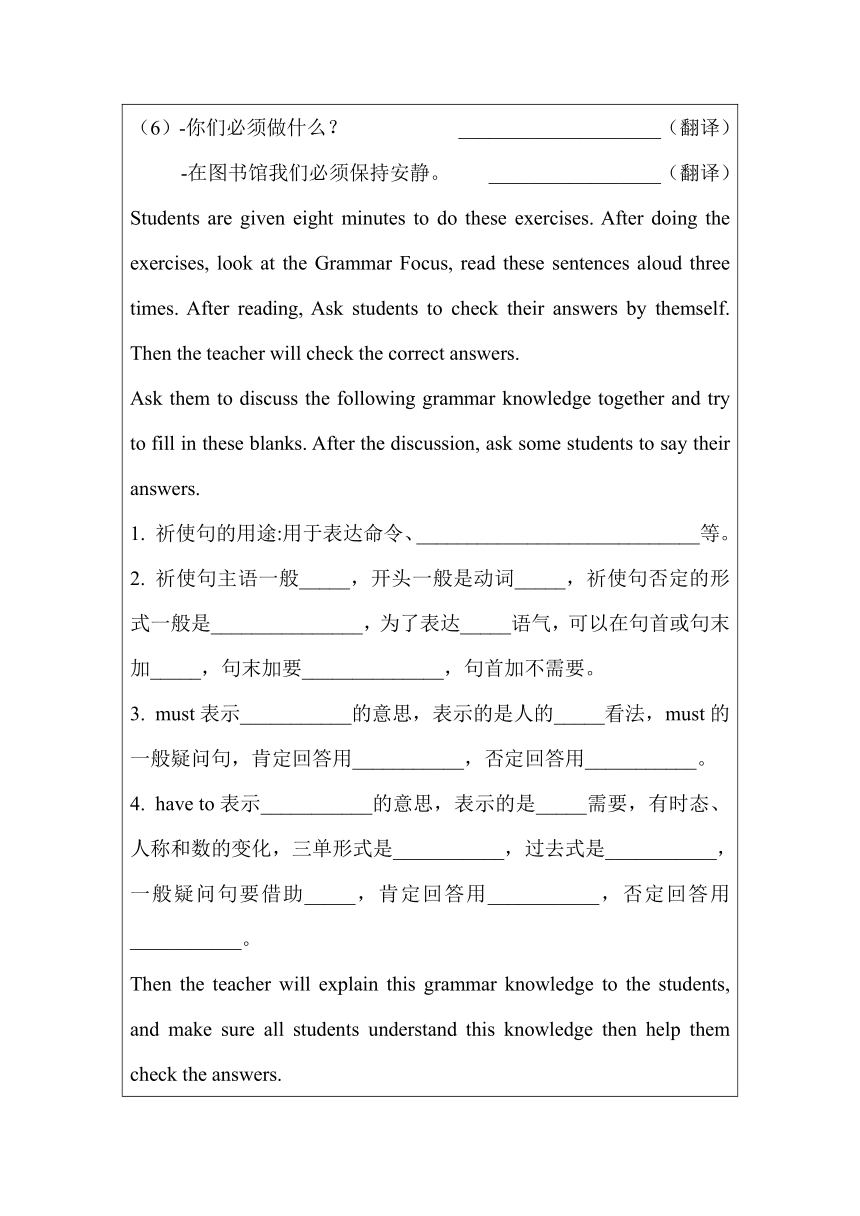Unit 4 Don't eat in class. Section A (Grammar Focus-3c)教案(表格式)
文档属性
| 名称 | Unit 4 Don't eat in class. Section A (Grammar Focus-3c)教案(表格式) |

|
|
| 格式 | zip | ||
| 文件大小 | 184.0KB | ||
| 资源类型 | 教案 | ||
| 版本资源 | 人教新目标(Go for it)版 | ||
| 科目 | 英语 | ||
| 更新时间 | 2022-03-25 19:17:03 | ||
图片预览



文档简介
Unit4 Don't eat in class.
Section A (Grammar Focus-3c)
年级: 班级: 授课老师:
科目: 第__单元第___课时 年级组长:
教学内容:本节课是语法课,语法内容主要是讲解祈使句和一些情态动词的使用方法以及如何回答相关的提问。
三维教学目标
知识目标 1.学生能够理解祈使句的句法作用,并能够运用祈使句的句型表达想要表达的意思。 学生能理解本单元出现的情态动词(can, have to, must)的含义和用法。
能力目标 1.学生们通过课堂训练能够提高自己的表达能力。 2.同学们通过课堂的教学活动能够提高思考和概括能力。
情感目标 通过课堂活动,同学们养成遵守规则的好习惯。
教学重难点
重点 同学们能理解祈使句的情感态度。
难点 怎样有效的讲解清楚祈使句本节课的知识点并帮助同学们总结规律。
主要教学步骤
Step 1: Lead-in (1)Greet the class with a smile as usual. (2)The teacher will show students some signs about various rules, such as traffic rules, school rules, class rules, restaurant rules and so on. Then ask the students these questions: Where can you see these signs What do they mean What should we do when we see these signs Students will have five minutes to discuss these questions, and then the teacher will invite some students to answer these questions. The teacher will give his own comments on every answers. Step 2:Presentation The teacher will play PPT and show some exercises. Ask students to try to complete these exercises: (1)-不要打架? ____________________(翻译) -不要在楼道里奔跑。 ____________________(翻译) (2)-规则是什么? ____________________(翻译) -我们必须按时上课。 ____________________(翻译) (3)-我们可以在教室里吃东西吗? ____________________(翻译) -不行,但我们可以在餐厅里吃。 ___________________(翻译) (4)-我们可以在上课的时候戴帽子? ___________________(翻译) -不行,我们不可以。 ___________________(翻译) (5)-他在学校必须穿校服吗? ____________________(翻译) -是的,必须/不,不必。 __________________(翻译) (6)-你们必须做什么? ____________________(翻译) -在图书馆我们必须保持安静。 _________________(翻译) Students are given eight minutes to do these exercises. After doing the exercises, look at the Grammar Focus, read these sentences aloud three times. After reading, Ask students to check their answers by themself. Then the teacher will check the correct answers. Ask them to discuss the following grammar knowledge together and try to fill in these blanks. After the discussion, ask some students to say their answers. 祈使句的用途:用于表达命令、____________________________等。 祈使句主语一般_____,开头一般是动词_____,祈使句否定的形式一般是_______________,为了表达_____语气,可以在句首或句末加_____,句末加要______________,句首加不需要。 must表示___________的意思,表示的是人的_____看法,must的一般疑问句,肯定回答用___________,否定回答用___________。 have to表示___________的意思,表示的是_____需要,有时态、人称和数的变化,三单形式是___________,过去式是___________,一般疑问句要借助_____,肯定回答用___________,否定回答用___________。 Then the teacher will explain this grammar knowledge to the students, and make sure all students understand this knowledge then help them check the answers. Step 3:Practice (1)Look at these signs, think about the meaning of these signs in 3a, ask students to write the rules for school library. After 3 minutes, the teacher will check the correct answers. (2)Look at 3b, make questions with the words given, and then answer them according to the situation of your school.You can do this like the first example.After 3 minutes, the teacher will check the correct answers. Game Think about your ideal school. You can make up five rules for your ideal school. Tell your classmates your school rules, discuss them together, and then vote on the coolest school.
板书设计: Important sentences: Don't fight. Don't run in the corridor What are the rules We must have classes on time. Can we eat in the classroom No, but we can eat in the restaurant. Can we wear hats in class. No, we can't. Does he have to wear the uniform at school Yes, he does. / No, he does't. What must you do We must keep quiet in the library.
小结: This lesson, we have learned some grammer knowledge about Imperative Sentence. And we have practiced how to use these words: must, have to.
家庭作业: (1)Copy and review these important sentences. (2)Retell this sentences in Grammar Focus.
Section A (Grammar Focus-3c)
年级: 班级: 授课老师:
科目: 第__单元第___课时 年级组长:
教学内容:本节课是语法课,语法内容主要是讲解祈使句和一些情态动词的使用方法以及如何回答相关的提问。
三维教学目标
知识目标 1.学生能够理解祈使句的句法作用,并能够运用祈使句的句型表达想要表达的意思。 学生能理解本单元出现的情态动词(can, have to, must)的含义和用法。
能力目标 1.学生们通过课堂训练能够提高自己的表达能力。 2.同学们通过课堂的教学活动能够提高思考和概括能力。
情感目标 通过课堂活动,同学们养成遵守规则的好习惯。
教学重难点
重点 同学们能理解祈使句的情感态度。
难点 怎样有效的讲解清楚祈使句本节课的知识点并帮助同学们总结规律。
主要教学步骤
Step 1: Lead-in (1)Greet the class with a smile as usual. (2)The teacher will show students some signs about various rules, such as traffic rules, school rules, class rules, restaurant rules and so on. Then ask the students these questions: Where can you see these signs What do they mean What should we do when we see these signs Students will have five minutes to discuss these questions, and then the teacher will invite some students to answer these questions. The teacher will give his own comments on every answers. Step 2:Presentation The teacher will play PPT and show some exercises. Ask students to try to complete these exercises: (1)-不要打架? ____________________(翻译) -不要在楼道里奔跑。 ____________________(翻译) (2)-规则是什么? ____________________(翻译) -我们必须按时上课。 ____________________(翻译) (3)-我们可以在教室里吃东西吗? ____________________(翻译) -不行,但我们可以在餐厅里吃。 ___________________(翻译) (4)-我们可以在上课的时候戴帽子? ___________________(翻译) -不行,我们不可以。 ___________________(翻译) (5)-他在学校必须穿校服吗? ____________________(翻译) -是的,必须/不,不必。 __________________(翻译) (6)-你们必须做什么? ____________________(翻译) -在图书馆我们必须保持安静。 _________________(翻译) Students are given eight minutes to do these exercises. After doing the exercises, look at the Grammar Focus, read these sentences aloud three times. After reading, Ask students to check their answers by themself. Then the teacher will check the correct answers. Ask them to discuss the following grammar knowledge together and try to fill in these blanks. After the discussion, ask some students to say their answers. 祈使句的用途:用于表达命令、____________________________等。 祈使句主语一般_____,开头一般是动词_____,祈使句否定的形式一般是_______________,为了表达_____语气,可以在句首或句末加_____,句末加要______________,句首加不需要。 must表示___________的意思,表示的是人的_____看法,must的一般疑问句,肯定回答用___________,否定回答用___________。 have to表示___________的意思,表示的是_____需要,有时态、人称和数的变化,三单形式是___________,过去式是___________,一般疑问句要借助_____,肯定回答用___________,否定回答用___________。 Then the teacher will explain this grammar knowledge to the students, and make sure all students understand this knowledge then help them check the answers. Step 3:Practice (1)Look at these signs, think about the meaning of these signs in 3a, ask students to write the rules for school library. After 3 minutes, the teacher will check the correct answers. (2)Look at 3b, make questions with the words given, and then answer them according to the situation of your school.You can do this like the first example.After 3 minutes, the teacher will check the correct answers. Game Think about your ideal school. You can make up five rules for your ideal school. Tell your classmates your school rules, discuss them together, and then vote on the coolest school.
板书设计: Important sentences: Don't fight. Don't run in the corridor What are the rules We must have classes on time. Can we eat in the classroom No, but we can eat in the restaurant. Can we wear hats in class. No, we can't. Does he have to wear the uniform at school Yes, he does. / No, he does't. What must you do We must keep quiet in the library.
小结: This lesson, we have learned some grammer knowledge about Imperative Sentence. And we have practiced how to use these words: must, have to.
家庭作业: (1)Copy and review these important sentences. (2)Retell this sentences in Grammar Focus.
同课章节目录
- Unit 1 Can you play the guitar?
- Section A
- Section B
- Unit 2 What time do you go to school?
- Section A
- Section B
- Unit 3 How do you get to school?
- Section A
- Section B
- Unit 4 Don't eat in class.
- Section A
- Section B
- Unit 5 Why do you like pandas?
- Section A
- Section B
- Unit 6 I'm watching TV.
- Section A
- Section B
- Review of Units 1-6
- Unit 7 It's raining!
- Section A
- Section B
- Unit 8 Is there a post office near here?
- Section A
- Section B
- Unit 9 What does he look like?
- Section A
- Section B
- Unit 10 I'd like some noodles.
- Section A
- Section B
- Unit 11 How was your school trip?
- Section A
- Section B
- Unit 12 What did you do last weekend?
- Section A
- Section B
